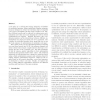Free Online Productivity Tools
i2Speak
i2Symbol
i2OCR
iTex2Img
iWeb2Print
iWeb2Shot
i2Type
iPdf2Split
iPdf2Merge
i2Bopomofo
i2Arabic
i2Style
i2Image
i2PDF
iLatex2Rtf
Sci2ools
130
click to vote
LCTRTS
1999
Springer
1999
Springer
Optimizing for Reduced Code Space using Genetic Algorithms
Code space is a critical issue facing designers of software for embedded systems. Many traditional compiler optimizations are designed to reduce the execution time of compiled code, but not necessarily the size of the compiled code. Further, different results can be achieved by running some optimizations more than once and changing the order in which optimizations are applied. Register allocation only complicates matters, as the interactions between different optimizations can cause more spill code to be generated. The compiler for embedded systems, then, must take care to use the best sequence of optimizations to minimize code space. Since much of the code for embedded systems is compiled once and then burned into ROM, the software designer will often tolerate much longer compile times in the hope of reducing the size of the compiled code. We take advantage of this by using a genetic algorithm to find optimization sequences that generate small object codes. The solutions generated...
Related Content
| Added | 04 Aug 2010 |
| Updated | 04 Aug 2010 |
| Type | Conference |
| Year | 1999 |
| Where | LCTRTS |
| Authors | Keith D. Cooper, Philip J. Schielke, Devika Subramanian |
Comments (0)

